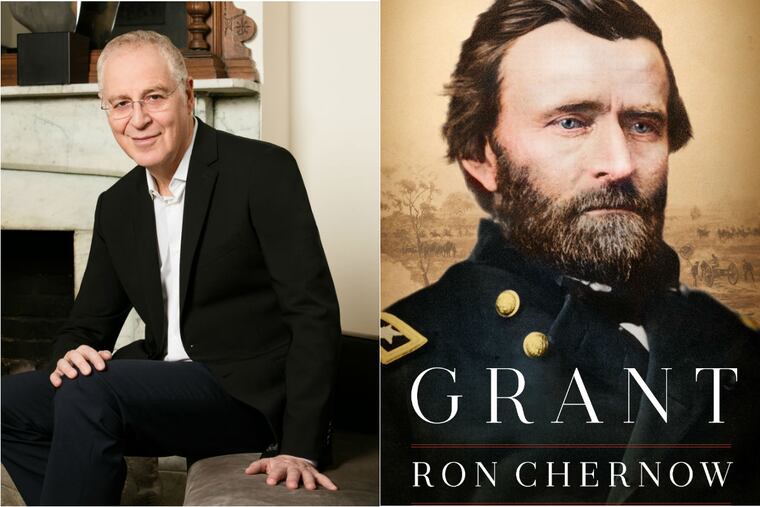Ron Chernow's 'Grant': New look at a misunderstood hero
Ron Chernow's new biography, a truly mammoth examination of the life of Ulysses S. Grant, gives us a hero with faults, but also a man of both frailty and incredible strength. Chernow, famed for his biography of Alexander Hamilton, argues Grant should join the pantheon of our great presidents.

Grant
By Ron Chernow
Penguin. 1104 pp. $40 nolead ends
nolead begins
Reviewed by Clayton Butler
nolead ends
Reading Ron Chernow's new biography, a truly mammoth examination of the life of Ulysses S. Grant, one is struck by the humanity - both the pitiful frailty and the incredible strength - of its subject. Grant, the 18th president of the United States and one of the greatest soldiers of all time, emerges in Chernow's telling as a man of remarkable contradictions. He was a man of firm moral beliefs, steadfast loyalty to friends and family, and fundamental honesty. Yet he also suffered from an incurable naïveté when it came to business and certainly met, in the author's estimation, the clinical criteria for alcoholism.
Grant was no "marble man," without faults or weaknesses. Yet his all-too-human limitations ultimately render his tremendous accomplishments all the more impressive. In this timely book, Chernow argues Grant does not deserve his long-held reputation for corruption and incompetence, and belongs in the pantheon of the greatest American leaders.
Grant's defining characteristics manifested early. Born Hiram Ulysses Grant in Ohio in 1822, he inherited his work ethic and strong antislavery views from his father, but appears to have been thoroughly his mother's son: quiet, sensitive, and sweet. Indeed, his father - self-promoting, occasionally obnoxious, and eager to make a profit off his son's fame - appears as an almost comic foil.
As a cadet at West Point, Grant brushed shoulders with a number of future comrades and adversaries and left an impression as a brilliant horseman, if not a brilliant student. During the Mexican War, he absorbed crucial lessons in military command from the towering figures of Zachary Taylor and Winfield Scott.
The period between the Mexican War and the Civil War marked the low ebb in Grant's life. His alcoholism first became a critical issue. He left the army under a cloud and endured a string of demoralizing financial failures, moving his young family several times.
In many ways, the outbreak of the Civil War was a godsend for Grant, who, now near 40, reentered the army. He overcame his reputation as an alcoholic and, after a string of resourceful victories in the western theater, rose to command all the Union forces. Unfairly derided as an unsophisticated tactician and a butcher, Grant, as Chernow shows, consistently sacrificed a lower proportion of his troops than Robert E. Lee did during the campaigns of 1864. He achieved victory over Lee's army not through numerical and logistical superiority but rather through a determination and focus that were his greatest strengths, and that other Union generals had conspicuously lacked.
Chernow also shows that Grant stood consistently ahead where civil rights for African Americans were concerned. Before most people did, he grasped that the war would end the institution of slavery in the United States. He further understood that the best way to prevent another war was to furnish African Americans with the civil rights that had made the Union worth fighting for in the first place: voting rights and social mobility. Frederick Douglass himself said Grant did more for African Americans than anyone else: first by winning the war, then by championing from the White House the rights of freed people.
For Chernow, Grant's greatest accomplishment as president was his fight against the Ku Klux Klan. Winning the peace, he found, became as difficult as winning the war. Chernow debunks the persistent myth that white Southerners under Reconstruction suffered under an occupying federal force. And unlike many previous scholars, Chernow defends Grant from charges of corruption and shows he bore little responsibility for the obscene concentrations of wealth that became a feature of American life during his presidency.
Grant's foibles ought not to diminish his legacy, Chernow seems to conclude, but rather enhance our appreciation. He struggled with his own deficiencies as much as he struggled against his military and political enemies. In the end, he triumphed over both, and did as much to shape the country we now live in as any 19th-century figure. He deserves to reclaim a place among the most celebrated Americans.
Clayton Butler is a doctoral candidate at the University of Virginia.